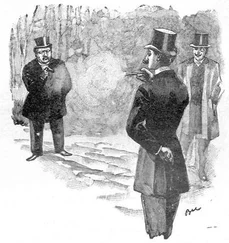In surprise, he stammered: "Why you—you are mad."
She continued to unwind the hairs and cast them upon the floor. With her woman's instinct she had divined their meaning and gasped in her anger, ready to cry:
"She loves you and she wished you to carry away with you something of hers. Oh, you are a traitor." She uttered a shrill, nervous cry: "Oh, it is an old woman's hair—here is a white one—you have taken a fancy to an old woman now. Then you do not need me—keep the other one." She rose.
He attempted to detain her and stammered: "No—Clo—you are absurd—I do not know whose it is—listen—stay—see—stay—"
But she repeated: "Keep your old woman—keep her—have a chain made of her hair—of her gray hair—there is enough for that—"
Hastily she donned her hat and veil, and when he attempted to touch her she struck him in the face, and made her escape while he was stunned by the blow. When he found that he was alone, he cursed Mme. Walter, bathed his face, and went out vowing vengeance. That time he would not pardon. No, indeed.
He strolled to the boulevard and stopped at a jeweler's to look at a chronometer he had wanted for some time and which would cost eighteen hundred francs. He thought with joy: "If I make my seventy thousand francs, I can pay for it"—and he began to dream of all the things he would do when he got the money. First of all he would become a deputy; then he would buy the chronometer; then he would speculate on 'Change, and then, and then—he did not enter the office, preferring to confer with Madeleine before seeing Walter again and writing his article; he turned toward home. He reached Rue Drouot when he paused; he had forgotten to inquire for Count de Vaudrec, who lived on Chaussee d'Antin. He retraced his steps with a light heart, thinking of a thousand things—of the fortune he would make,—of that rascal of a Laroche, and of old Walter.
He was not at all uneasy as to Clotilde's anger, knowing that she would soon forgive him.
When he asked the janitor of the house in which Count de Vaudrec lived: "How is M. de Vaudrec? I have heard that he has been ailing of late," the man replied; "The Count is very ill, sir; they think he will not live through the night; the gout has reached his heart."
Du Roy was so startled he did not know what to do! Vaudrec dying! He stammered: "Thanks—I will call again"—unconscious of what he was saying. He jumped into a cab and drove home. His wife had returned. He entered her room out of breath: "Did you know? Vaudrec is dying!"
She was reading a letter and turning to him asked: "What did you say?"
"I said that Vaudrec is dying of an attack of gout."
Then he added: "What shall you do?"
She rose; her face was livid; she burst into tears and buried her face in her hands. She remained standing, shaken by sobs, torn by anguish. Suddenly she conquered her grief and wiping her eyes, said: "I am going to him—do not worry about me—I do not know what time I shall return—do not expect me."
He replied: "Very well. Go."
They shook hands and she left in such haste that she forgot her gloves. Georges, after dining alone, began to write his article. He wrote it according to the minister's instructions, hinting to the readers that the expedition to Morocco would not take place. He took it, when completed, to the office, conversed several moments with M. Walter, and set out again, smoking, with a light heart, he knew not why.
His wife had not returned. He retired and fell asleep. Toward midnight Madeleine came home. Georges sat up in bed and asked: "Well?"
He had never seen her so pale and agitated. She whispered: "He is dead!"
"Ah—and—he told you nothing?"
"Nothing. He was unconscious when I arrived."
Questions which he dared not ask arose to Georges' lips.
"Lie down and rest," said he.
She disrobed hastily and slipped into bed.
He continued: "Had he any relatives at his death–bed?"
"Only a nephew."
"Ah! Did he often see that nephew?"
"They had not met for ten years."
"Had he other relatives?"
"No, I believe not."
"Will that nephew be his heir?"
"I do not know."
"Was Vaudrec very rich?"
"Yes, very."
"Do you know what he was worth?"
"No, not exactly—one or two millions perhaps."
He said no more. She extinguished the light. He could not sleep. He looked upon Mme. Walter's promised seventy thousand francs as very insignificant. Suddenly he thought he heard Madeleine crying. In order to insure himself he asked: "Are you asleep?"
"No." Her voice was tearful and unsteady.
He continued: "I forgot to tell you that your minister has deceived us."
"How?"
He gave her a detailed account of the combination prepared by Laroche and Walter. When he concluded she asked: "How did you know that?"
He replied: "Pardon me if I do not tell you! You have your means of obtaining information into which I do not inquire; I have mine which I desire to keep. I can vouch at any rate for the truth of my statements."
She muttered: "It may be possible. I suspected that they were doing something without our knowledge."
As she spoke Georges drew near her; she paid no heed to his proximity, however, and turning toward the wall, he closed his eyes and fell asleep.
The church was draped in black, and over the door a large escutcheon surmounted by a coronet announced to the passers–by that a nobleman was being buried. The ceremony was just over; those present went out slowly, passing by the coffin, and by Count de Vaudrec's nephew, who shook hands and returned salutations.
When Georges du Roy and his wife left the church, they walked along side by side on their way home. They did not speak; they were both preoccupied. At length Georges said, as if talking to himself: "Truly it is very astonishing!"
Madeleine asked: "What, my friend?"
"That Vaudrec left us nothing."
She blushed and said: "Why should he leave us anything? Had he any reason for doing so?" Then after several moments of silence, she continued: "Perhaps there is a will at a lawyer's; we should not know of it."
He replied: "That is possible, for he was our best friend. He dined with us twice a week; he came at any time; he was at home with us. He loved you as a father; he had no family, no children, no brothers nor sisters, only a nephew. Yes, there should be a will. I would not care for much—a remembrance to prove that he thought of us—that he recognized the affection we felt for him. We should certainly have a mark of friendship."
She said with a pensive and indifferent air: "It is possible that there is a will."
When they entered the house, the footman handed Madeleine a letter. She opened it and offered it to her husband.
"OFFICE OF M. LAMANEUR,
Notary.
17 Rue des Vosges,"
"Madame: Kindly call at my office at a quarter past two o'clock Tuesday, Wednesday, or Thursday, on business which concerns you."
"Yours respectfully,"
"LAMANEUR."
Georges, in his turn, colored.
"That is as it should be. It is strange, however, that he should write to you and not to me, for I am the head of the family legally."
"Shall we go at once?" she asked.
"Yes, I should like to."
After luncheon they set out for M. Lamaneur's office.
The notary was a short, round man—round all over. His head looked like a ball fastened to another ball, which was supported by legs so short that they too almost resembled balls.
He bowed, as Du Roy and his wife were shown into his office, pointed to seats, and said, turning to Madeleine: "Madame, I sent for you in order to inform you of Count de Vaudrec's will, which will be of interest to you."
Читать дальше











